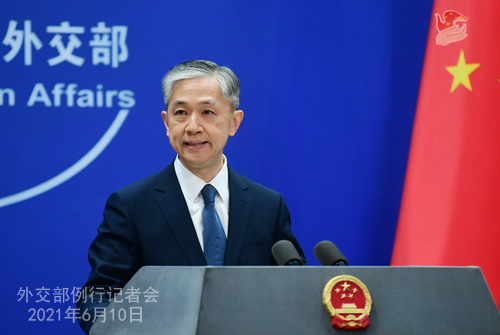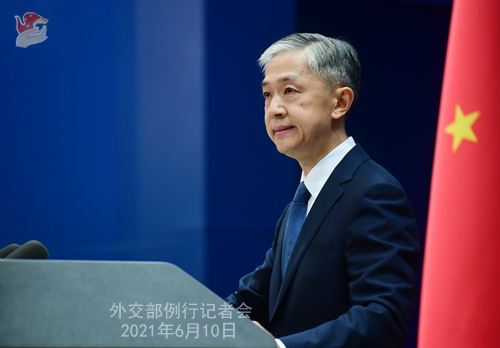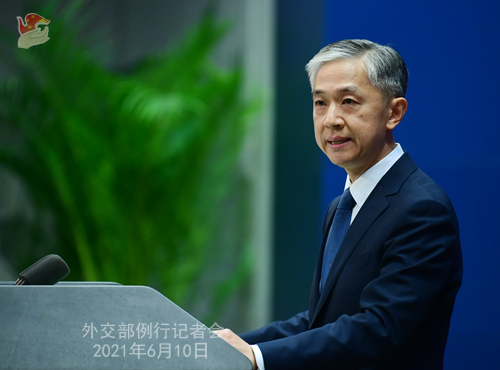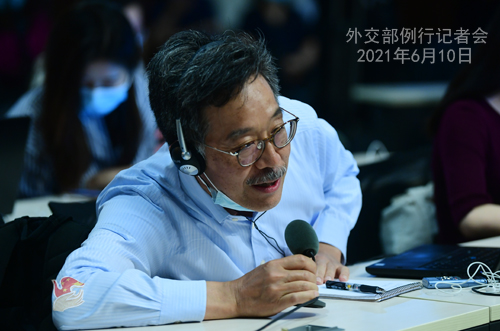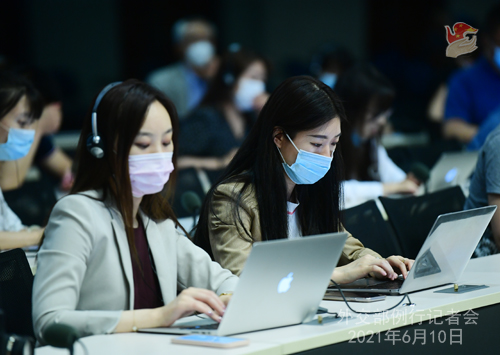| Foreign Ministry Spokesperson Wang Wenbin's Regular Press Conference on June 10, 2021 |
| 2021-06-10 20:28 |
|
CCTV: We noticed that after the outbreak of COVID-19, China launched the "spring sprout" program to help overseas Chinese citizens get vaccinated. In the meantime, China also rolled out many measures to facilitate vaccination for foreigners in China. Can you tell us more about the relevant situation? Wang Wenbin: Ever since the COVID-19 outbreak, the safety and health of overseas Chinese nationals have been close to the heart of the CPC and the Chinese government. On March 7, State Councilor and Foreign Minister Wang Yi announced the launch of the "spring sprout" program at a press conference during the "two sessions". The Ministry of Foreign Affairs and Chinese diplomatic missions abroad have taken actions to help Chinese compatriots abroad get vaccinated. So far, more than 1.18 million overseas Chinese in more than 150 countries have been inoculated with Chinese or foreign vaccines. Chinese compatriots at home and abroad all applaud this heart-warming program, which brings the caring solicitude of the motherland across the world. Going forward, we will continue to strengthen communication with relevant countries. On the precondition of strict compliance with local laws and regulations and with full respect to the will of the Chinese nationals, we will provide assistance to our citizens in receiving vaccination, so as to better protect the safety and health of our people abroad. In the meantime, the Chinese government attaches great importance to protecting the safety and health of foreign nationals in China. To facilitate their work, life and study in China, and also to build an effective immunity barrier to the greatest extent, China has extended the coverage of the inoculation program with Chinese vaccines to foreign nationals of eligible age. Subnational governments have taken a host of measures to facilitate foreigners' vaccination in accordance with local conditions, such as creating convenient online reservation channels, issuing multilingual mini programs for appointment and registration, designating outpatient clinics of international hospitals as vaccination sites, and deploying volunteers to provide language service. Such efforts have been much applauded by all sides. So far, more than 200,000 foreign nationals have been vaccinated in China. Associated Press: There are some reports that President Biden of the US, at the G7 summit this week, will announce that the US will donate 500 million doses of Pfizer vaccines to COVAX. I wanted to see whether China had any reaction or comment and also ask if China is thinking at all of increasing its donation or distribution of vaccine through COVAX? Wang Wenbin: As we all know, until recently, the US has been stressing that its top priority with vaccines is domestic rollout. Now that it has announced donation to COVAX, we hope it will honor its commitment as soon as possible. China always believes that vaccines, as powerful weapons against the pandemic, should be made a global public good, to benefit as many people as possible all over the world. China has been calling on the international community to demonstrate solidarity against the virus and for major vaccine R&D and manufacturing countries to assume their responsibility and support COVAX with concrete actions so that the developing world can have early access to affordable doses. The Chinese government and companies have been conducting vaccine cooperation with partners in various countries through such means as donation, export and joint production in a bid to promote the equitable and appropriate global distribution of vaccines. Despite the huge domestic demand and limited supply, China has done its best to donate vaccines to more than 80 developing countries in urgent need, and export doses to over 40 countries. We have provided 350 million doses to global cooperative partners, more than any other country in the world. China has announced to provide an initial 10 million doses to COVAX designated for emergency use in developing countries, of which the first batch officially rolled off production line not long ago. The listing of China's Sinopharm and Sinovac vaccines for emergency use by the WHO will enable Chinese vaccines to make greater contributions to the global response. Currently the vast developing world is still facing special difficulties and challenges in obtaining vaccines and fighting COVID-19. We can fully relate to them. Not long ago, President Xi Jinping announced a series of new measures China would take to support the global response at the Global Health Summit. China will stay committed to its pledge of making vaccines a global public good, continue to do its best to provide more vaccines to other countries, and continue to support Chinese vaccine companies in conducting technology transfer and joint production with other developing countries, so as to help more countries especially developing ones to gain early access to affordable vaccines, narrow the vaccination divide, and work with others to build a global community of health for all.
FSN: Australian Prime Minister Scott Morrison previously said that the WTO should penalize bad behavior when it occurs, and then separately referring to tariffs that China has placed on Australian exports, he said on the radio interview that barley and wine producers in Australia have been targeted with trade sanctions that "we believe are completely unconscionable". What's China's comment? Wang Wenbin: On your first question, as is well known, major Western countries formulate most of the rules of world trade. It is their customary practice to maintain their hegemony and contain the growth of developing countries. Who has long been manipulating, maliciously circumventing WTO rules and paralyzing the DSM by thwarting selection of Appellate Body judges? Who has politicized trade and economic issues, stretched the concept of national security and abused state power to suppress and contain foreign companies? The Australian side has a clear idea. China firmly opposes the politicization of economic and trade issues and all kinds of bullying and political manipulation. We urge relevant countries to stop the wrong practice of wantonly wielding the big stick of sanctions to pressure other countries, and take more concrete actions and play a more positive role in upholding the multilateral trading regime and promoting fair trade. On your second question, the measures China takes on imported products are aimed to protect the rights and interests of domestic industries and consumers. They are in strict compliance with Chinese laws and regulations as well as WTO rules and are completely justified and lawful. Xinhua News Agency: Former Mongolian Prime Minister and Chairman of the Mongolian People's Party (MPP) Ukhnaa Khurelsukh won a landslide victory in the country's presidential election yesterday. Do you have any comment? Wang Wenbin: Mr. Ukhnaa Khurelsukh is a Mongolian statesman familiar to the Chinese people. He has long been dedicated to promoting friendly cooperation between China and Mongolia and made important contributions to the development of bilateral relations. We extend congratulations on his election as Mongolian president. China and Mongolia are friendly neighbors and sincere cooperative partners linked by mountains and rivers. Bilateral relations have maintained a sound momentum of development in recent years. Since the outbreak of COVID-19, the two sides have made concerted efforts to combat the virus and achieved positive results. We stand ready to continue working with Mongolia for new and greater development of the China-Mongolia comprehensive strategic partnership. AFP: President Joe Biden on Wednesday revoked an executive order from his predecessor to ban Chinese-owned mobile apps TikTok and WeChat over national security concerns. What's your reaction to this particular development? Wang Wenbin: I noted relevant reports and would like to refer you to competent authorities and relevant companies for more information. In principle, China urges the US side to earnestly respect market economy principles and international economic and trade rules, stop stretching national security concept, stop abusing state power to groundlessly suppress Chinese tech companies, and treat Chinese businesses in a fair, just and non-discriminatory manner. The Chinese government will continue to resolutely safeguard legitimate rights and interests of Chinese companies.
Bloomberg: I have two questions for you if I may. US Secretary of Defense Lloyd Austin issued a directive aimed at reorienting America's military to better compete with China. The Pentagon said the initiatives "are designed to focus departmental processes and procedures and better help department leaders contribute to whole-of-government efforts to address the challenge from China." How worried is China about this development? And the second question, US President is heading to Europe for a G7 summit that will in part be an effort to start building an alliance to keep China in check. Critics say that in the two decades since China joined the WTO, its government has exploited the rules to deploy as much as $500 billion of state aid to create dominant companies in sectors including robotics, aircraft and electric cars. What is the foreign ministry's comment on this accusation and on the plans by the US to build this alliance? Wang Wenbin: On your first question, some in the US, clinging to the Cold War and zero-sum mentality, never talk about defense buildup without mentioning the "China challenge". The China card has become the most handy excuse for the US to increase its defense budget and expand its military force. Beneath the disguise of " addressing the challenge posed by China" lies the malicious intent of the US to seek total hegemony and absolute security and contain China. As we all know, the US military expenditure ranks first in the world, equivalent to the combined military spending of the next nine countries behind it for years in a row, and about four times that of China. The US has over 800 military bases overseas. Throughout its entire history, only 16 years were free from warfare. It is crystal clear as to who is the threat and challenge. We urge the US to abandon the obsolete Cold War and zero-sum mentality, view China's development in an objective and rational light, stop making an issue out of China at every turn, and play a constructive role in upholding peace and stability in the Asia-Pacific, instead of the contrary. On your second question, I'd like to point out that those fanning confrontation are definitely on an ill-advised path. Peace, development and win-win cooperation is the trend of our times and all countries' shared aspiration. Ganging up, pursuing bloc politics and forming small cliques are unpopular and doomed to fail. We hope relevant countries will discard ideological bias, look at China in an objective and rational light, and take more concrete actions to promote global anti-COVID cooperation, boost world economic recovery and help accelerate developing countries' growth. I would also like to stress that since China's accession to the WTO two decades ago, we have fulfilled our obligations and honored our commitment. We always comply with WTO rules and firmly safeguard the WTO-centered multilateral trading regime. We hope relevant countries can adopt an open, inclusive, cooperative and constructive attitude when discussing global issues and play a more positive role in upholding the multilateral trading regime and facilitating a steady recovery of the world economy. Yonhap News Agency: On June 9, State Councilor and Foreign Minister Wang Yi spoke with the ROK Foreign Minister Chung Eui-yong over the phone. The timing of their phone call right before the G7 summit has attracted much attention from the media. We noticed that State Councilor Wang Yi mentioned the US in the conversation. Does that mean China is trying to hold the US at bay in the run-up to the G7 summit? What's the foreign ministry's comment on this phone call? Wang Wenbin: The phone call was made first and foremost out of the need for communication between the two sides. The Chinese side has released a readout about this telephone conversation. We believe this is a successful phone call, during which the two sides reached broad consensus on bilateral relations and issues of mutual interest. We stand ready to work with the ROK to implement relevant consensus and move bilateral relations forward. Kyodo News Agency: The NPC Standing Committee just approved the law on countering foreign sanctions. Can you brief us on the significance of the legislation? Will it have an impact on China's foreign relations with some countries? Wang Wenbin: We elaborated China's principled position on the relevant legislation. I would like to reiterate that in order to resolutely safeguard national sovereignty, dignity and core interests and oppose Western hegemonism and power politics, the Chinese government has launched multiple corresponding countermeasures against entities and individuals of relevant countries. We believe that it is necessary for China to formulate a specific law on countering foreign sanctions to provide legal support and guarantee for the country to counter discriminatory measures by a foreign country in accordance with the law. The concern you mentioned that this legislation may affect China's relations with other countries is completely unnecessary.
The Paper: On June 9, Japanese Prime Minister Yoshihide Suga listed Australia, New Zealand, and Taiwan as "nations" that had adopted strong restrictions on private rights in a debate with opposition party leader at the National Diet. Do you have any comment? Wang Wenbin: I noted relevant reports. Japanese leaders flagrantly refer to Taiwan as a "country" on multiple occasions, severely violating principles set out in the four political documents including the Sino-Japanese Joint Statement and its solemn and repeated commitment of not seeing Taiwan as a country. China is strongly dissatisfied with Japan's wrong remarks and has lodged solemn representations to the Japanese side. We ask Japan to make prompt clarification, remove the severe damage and ensure that such things won't happen again. There is only one China in the world and Taiwan is an inalienable part of China's territory. The Taiwan question bears on the political foundation of China-Japan relations, the basic trust and good faith between the two countries and the international rule of law and justice. We seriously urge the Japanese side to earnestly honor its commitment, be prudent in words and actions, avoid undermining China's sovereignty in any form and refrain from sending any wrong signal to the "Taiwan independence" forces. China Youth Daily: We have noted recently that an expert with the Wuhan Institute of Virology (WIV) of the Chinese Academy of Sciences said that the so-called "Wuhan lab leak" is a groundless lie. The expert challenged the few accusers in the West to produce the evidence, if they have any, adding that foreign media reports claiming three WIV researchers got infected are completely fake news, as nobody with the WIV ever contracted the novel coronavirus. What's your comment? Wang Wenbin: Experts with the Wuhan Institute of Virology (WIV) of the Chinese Academy of Sciences have repeatedly stated that nobody with the WIV ever contracted the novel coronavirus and the allegation that "the Wuhan lab leaked the virus" is nothing but a rumor. Early this year, the WHO-China joint mission visited the WIV and held in-depth exchange with experts there. The joint mission agrees that it is extremely unlikely that the virus came from a lab incident. Peter Daszak, member of the WHO international expert group and president of EcoHealth Alliance, said in a recent interview with an American media outlet, "There is no evidence that this was a virus created in a lab ... In fact, we've worked with the lab in Wuhan for 15 years now ... And we know that they do not have that virus in the lab". Although Chinese and foreign experts and the WHO have given their authoritative and science-based views on the "lab leak" hypothesis, some US politicians and media are still vigorously hyping up the narrative that "the virus was leaked from the WIV" and pushing for investigations into it. This reminds one of a similar scene nearly 20 years ago, when the US was hyping up its assertion that Iraq possessed "weapons of mass destruction" to prepare the ground for the Iraq War. Its modus operandi remains unchanged: disregard authoritative international institutions' views, apply presumption of guilt and try to mislead the public with allegations without factual basis from some officials and intelligence officers. The author of disinformation in both cases is the same person. According to reports, the person who is driving the media hype-up of the WIV leak claim is the Michael Gordon, the same person who authored the "aluminum tube story" on Iraq in September 2002. Given the fact that the US waged war on Iraq with a fictional WMD threat in order to realize its geopolitical goals, we cannot help but ask, what is it up to this time by hyping up the utterly unfounded "lab leak theory" and calling for "investigations" in China? If the true aim of the US is to study the origins of the virus, then why not rely on scientists as the mainstay instead of the intelligence community? If the US wants to identify the origins of the virus, then why put a 90-day limit to the process? Origins studies can go on for years or decades without finding a conclusive answer. What kind of conclusion can the intelligence community arrive at within 90 days? If the US really attaches importance to transparency, then when can it invite WHO experts to visit the Fort Detrick base, given that China has already invited WHO experts in for two rounds of origins study and that WHO experts have also visited various bio-labs including the WIV? It must be pointed out that the US is politicizing origins study to serve its selfish interests at the expense of the welfare, life and health of people in all countries. The international community should all be vigilant and reject such moves.
|
| |||||||||||||||
|
|||||||||||||||


